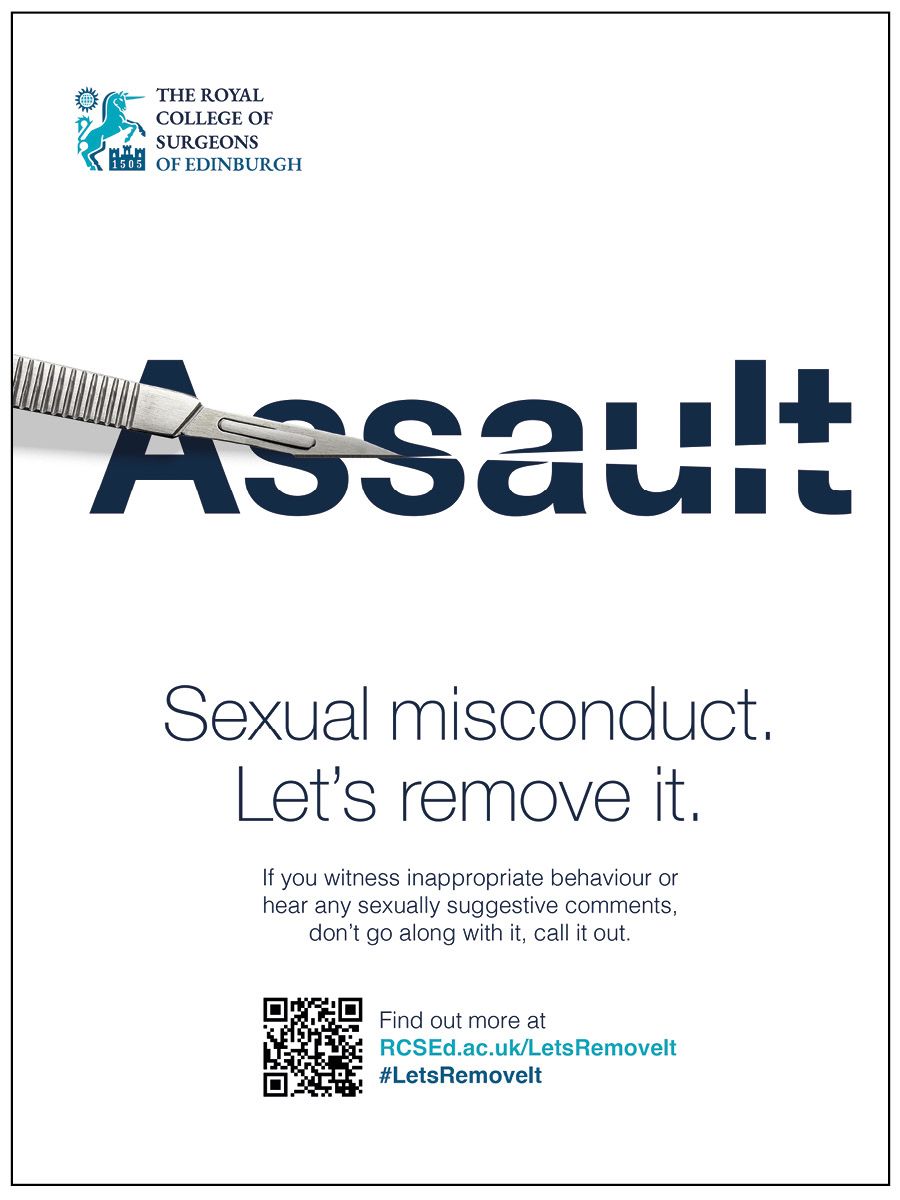SEXUAL MISCONDUCT
Let’s remove it
We all have a part to play in changing the culture we work in


Clare McNaught
RCSEd Vice-President
I recently attended the 20-year anniversary of the launch of the Non-Technical Skills for Surgeons course (NOTSS) at the College. The introduction of its concepts into routine clinical practice were revolutionary when NOTSS began and, for many years, we have considered this course as one of the jewels in our crown of educational offerings to Members and Fellows.
On reflection, it seems astonishing that we did not recognise the impact our everyday behaviour had on patient outcomes. We now fully understand that poor communication, leadership and teamwork lie at the root of the majority of never events in the NHS, and are the cause of the bulk of complaints and litigation claims. We also know that the culture of a workplace can have a significant influence on staff wellbeing, recruitment and retention, absence rates and team productivity. So, what is the culture like in today’s NHS?
In a recent NHS survey of more than 700,000 staff, 41% reported feeling unwell due to work-related stress. Meanwhile, 25% had experienced harassment, bullying or abuse from patients or their relatives in the last year, and over 18% had experienced this behaviour from a colleague.
Harassment at work
In the surgical workforce census published last year, nearly half the respondents cited working conditions as their main challenge, with more than 50% of respondents across all career grades considering leaving the profession within five years. In addition, 24% of surgeons reported bullying and undermining, the rates increasing to 35% for SAS surgeons and locally employed doctors.
ASiT also released survey data last year stating that 55.2% of trainees had experienced bullying, but only 32.8% reported it. This suggests that recognition of the issue is not a problem, but there is either an unwillingness, fear or lack of knowledge on how to deal with this issue.
We know that certain demographic groups are even more likely to be the victims of unwanted behaviour, particularly international medical graduates, those from the LGBTQ+ community and women. The report from the Working Party on Sexual Misconduct in Surgery (WPSMS) Breaking the Silence and the Surviving in Scrubs group also highlighted the levels of sexual misconduct and violence impacting our surgical teams, with more than 63.3% of women and 23.7% of men reporting episodes of sexual harassment in the last five years.
This is much higher than the reported rates in the NHS survey, where 8.6% reported instances of unwanted sexual behaviour from the patients and their relatives, and 3.8% from other members of staff. Whether this indicates a true increased prevalence in the surgical profession is difficult to determine, but I am sure we all agree that this conduct should not happen at all.
“We know that certain demographic groups
are even more likely to be the victims of unwanted behaviour”
For many years the College has taken steps to raise awareness of the importance of workplace culture and has run events and programmes aimed at highlighting the issues and supporting surgical team wellbeing.
In 2017 the first national campaign aimed at undermining and bullying, #LetsRemoveIt, was launched by the then College President Mike Lavelle-Jones and Trainee Chair Alice Hartley, with a double-bladed scalpel and the slogan: “Bullying harms your profession and your patients”. There were online resources for those who were victims of bullying and help for those who were the perpetrators of this behaviour, to help them reflect on and adapt their conduct.
These resources have been updated to reflect current practice and a new course, Addressing Confilct in Surgical Teams (ACT), has been developed to equip our Members and Fellows with the appropriate skills to diffuse challenging situations and foster improved working relationships.

College Members with the #LetsRemoveIt poster picturing the double-bladed scalpel
College Members with the #LetsRemoveIt poster picturing the double-bladed scalpel
Raising awareness
Given the recently reported levels of sexual misconduct, we have also added additional material to the #LetsRemoveIt campaign to focus on unwanted sexual behaviour. Our marketing and communication department worked collaboratively with design agencies, devising a hard-hitting visual campaign displaying the common behaviours we need to eradicate, including sexting, groping, harassment, touching, assault and innuendo.
We have kept the theme of the surgical blade cutting through these words and hope these posters will be displayed around hospitals to stimulate discussion about the issue in each of your localities. There are also resources on the College website to help those affected, and there is advice for those who may receive reports of this behaviour on what to do to support the victims and help them through the reporting process.
While this campaign is designed to raise awareness of the issue, it will not stop sexual misconduct unless we all play a part in changing the culture that we work in. First, we need to reflect on our own behaviour and modify it appropriately. We also have to acknowledge our position of power, seniority and privilege over other members of the team we work with and be sure not to abuse this.
One of the great joys of being a surgeon is the surgical banter that occurs in theatre, but the theatre environment is a common source of reports of unprofessional behaviour as conversations can easily cross the line of acceptability. None of us wants to work in a humourless, sterile location, but I would ask you to consider whether you would have made that joke or comment in the theatre if the patient was awake and not under general anaesthesia? It is important to note that issues of sexual misconduct also often occur out of the hospitals at conferences, particularly when alcohol is involved.
Workplace culture
As a College, we understand our own personal behaviour is only one aspect of dealing with this issue. On your behalf we have also been working with the GMC, NHS employers and statutory education bodies to try to improve the reporting systems and address the mistrust many have in escalating concerns due to the impact this has on us personally and professionally.
Let us all go forward with a renewed commitment to improving the workplace culture in our own teams and the wider NHS, not only to improve our own wellbeing, but also for the benefit of our patients.

The Assault poster from the #LetsRemoveIt campaign
The Assault poster from the #LetsRemoveIt campaign


